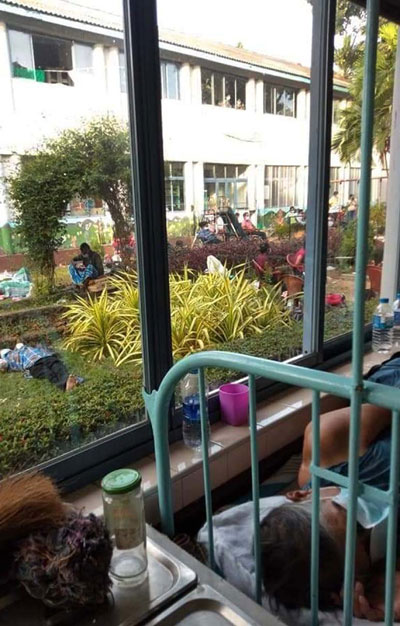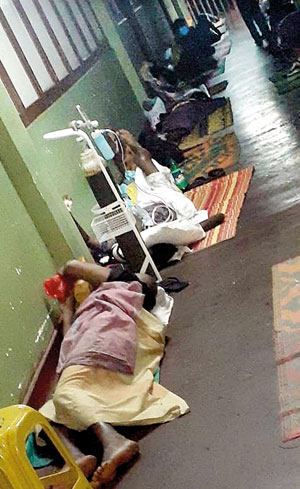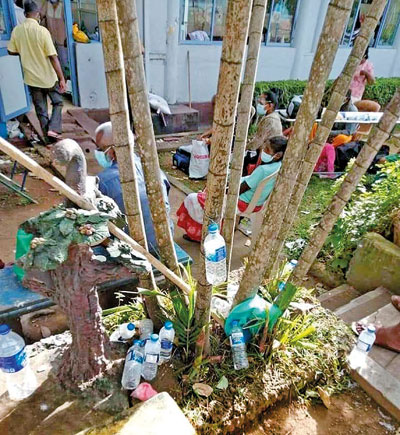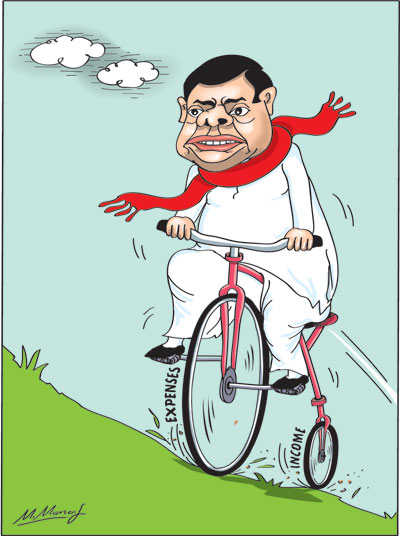Columns
- Govt. decides to recruit 20 top diplomats from blue-chip companies
- COVID-19 pandemic at worst levels, specialists say relaxation of restrictions was ill-planned and provoked by impatience
- Association of Medical Specialists issues tough statement saying, “It is better to have a living problem than a dead certainty”

With key state hospitals being overwhelmed with covid patients, there were not enough beds for the patients. Some were given plastic chairs in the hospital garden while others slept on mats on the corridors.
The Ministry of Foreign Affairs, in an unprecedented move, has turned to the private sector to recruit mid-career diplomats.
This major change in procedure is the result of the Ministry being struck by debacles due to the lack of professional expertise. Is this the real situation in the Ministry, or does the fault lie in the hands of the administration and the political leadership? It is a question over whether this once august institution has lost its position in the conduct of the country’s foreign relations. From the very origin of the current administration, the related policy appears to have evolved in the informed positions being formulated to the detriment of the country in the international arena.
It has also led to even the talented and well-experienced Ministry officials to go into slumber, which is natural if they are being ignored by the political hierarchy. Hence the failure on foreign relations cannot be foisted wholly on the professionals of the Ministry. Therefore, this has led to Sri Lanka’s image being lowered in the eyes of the international community. Questions are being raised over the new process due to several reasons, particularly if this new path would concertedly address the catastrophic failure. One is that it will deny opportunities to career diplomats, some of whom have climbed the ladder to become heads of missions. The other is whether select private sector establishments were a suitable mechanism to pick those who represent Sri Lanka.
Sugeeshwara Gunaratne, Director General, Public Diplomacy in the Foreign Ministry and its spokesperson told the Sunday Times, “The programme to broaden Sri Lanka’s representatives in certain specific fields with expertise from the private sector has been approved by the cabinet following a proposal from the President. The Foreign Ministry is the implementing agency. It has been decided to select 20 persons with expertise from different fields to be assigned for a two-year period in selected missions. “The objective is to get the contribution of persons who are experts in different areas such as climate change and international trade”.
Among the Sri Lankan corporates that have been given the task are MAS Holdings, Hayleys, Siddhalepa, Brandix and John Keells. A flyer put out by MAS Holdings saying “Professionals Wanted to represent Sri Lanka to the world” sets out the common format in which the proposed recruitment is to be made. Applications for the positions have been closed on Friday, August 7.
This is what the flyer has to say: “MAS is partnering with the Foreign Ministry of Sri Lanka to give you the opportunity to serve as a diplomatic professional in an area of expertise as below:
International Trade, Finance, Investment Promotion
(Posting at Dhaka, New York, Shanghai, or Tokyo)
Environment and climate change
(Posting at Nairobi)
Renewable/Sustainable Energy
(Posting at Stockholm)
“Innovation and Skill Development
(Posting at Berlin or Beijing)
 “DGM or above MAS employees with Sri Lankan citizenship possessing a postgraduate or undergraduate degree from an institution recognised by the University Grants Commission (UGC) of Sri Lanka and with a proven track record of eight to 13 years may apply.
“DGM or above MAS employees with Sri Lankan citizenship possessing a postgraduate or undergraduate degree from an institution recognised by the University Grants Commission (UGC) of Sri Lanka and with a proven track record of eight to 13 years may apply.
“These will be diplomatic postings and you will be ranked “First Secretary,” to “Third Secretary” based on experience. Remuneration and benefit will be as for the rank of the Sri Lanka Foreign Service Personnel and borne by the Ministry.
“Upon the completion of your assignment, you will return to MAS to a role similar to your current role.
“Please keep your Line Manager and respective HR departments informed when applying for the post. Group HR will be conducting the first interview and short-listed candidates for posting will then be interviewed by the Presidential Secretariat and the Foreign Ministry, for final approval by the President of Sri Lanka. “
The basis for the choice of capitals and their related areas is unclear. Whilst, for instance, Nairobi has been identified for Environment and Climate Change, maybe it is due to the UN Environment Programme (UNEP) being headquartered in that capital city. UNEP is the leading global environmental authority that sets the global environmental agenda, provides the coherent implementation of the environmental dimension of sustainable development within the UN system, and serves as an authoritative advocate for the global environment. UNEP’s mandate is delivered through effecting multilateral environmental agreement and projects by bringing together nations and the environmental community in tackling the challenges. It must be facilitated and driven by government officials, in this case diplomatic officers from the profession. Therefore, it is mind boggling as to how an individual pole-vaulting from a blue-chip company could add value in a better way. No consideration has been given to this aspect.
Furthermore, the subject of “innovation and skills development” with a posting in the German capital of Berlin or the Chinese capital of Beijing being identified also comes into question. Generally, these aspects are dealt in the context of development cooperation extended on a government-to-government basis, as in the form of technical/vocational institutes established by the GTZ (Gessellschaft fuyr Technische Zusmmenabel) ,the federally owned international cooperation enterprise in Germany. In this context, would the envisaged private sector officer seek to have that person’s skills developed or pursue a personal agenda?
 As for the areas of International Trade, Finance, and Investment promotion, undoubtedly a person from the private sector will take to the mandate like a duck to the water. However, does not the government realise the imperative need to put the ‘house in order’ to attract enhanced international trade, finance, and investment? Presidential Secretary Dr P.B. Jayasundera, regarded widely as a one of the topmost financial brains of the Government, has been advocating the need for Foreign Direct Investment (FDI). He has exhorted many a time that the Government did not favour foreign borrowings to address the ills of Sri Lanka’s economy.
As for the areas of International Trade, Finance, and Investment promotion, undoubtedly a person from the private sector will take to the mandate like a duck to the water. However, does not the government realise the imperative need to put the ‘house in order’ to attract enhanced international trade, finance, and investment? Presidential Secretary Dr P.B. Jayasundera, regarded widely as a one of the topmost financial brains of the Government, has been advocating the need for Foreign Direct Investment (FDI). He has exhorted many a time that the Government did not favour foreign borrowings to address the ills of Sri Lanka’s economy.
Such a prescription could be deemed empty rhetoric, considering Sri Lanka occupying the 104th slot in the world’s ‘Ease of Doing Business Index’. Hence, should not the starting point be to study and rectify the areas which have plunged the country to such a low level? In fact, both the United States State Department through its report and US Ambassador Allaina B. Teplitz have echoed the drawbacks in the conduct of business with Sri Lanka, with the responsibility for the difficulties being identified as the Government. If Sri Lanka offered an investor and business friendly climate, internationally, entrepreneurs would be naturally attracted. Some of the capitals identified for persons from the private sector are rather strange. For instance, the Japanese capital of Tokyo already has an officer from the Department of Commerce. In the Chinese city of Shanghai, a Consulate is facilitated by Beijing. Two Trade officers are already serving in this. It seems that even in this cash strapped environment, spending foreign exchange is not an issue for the Government.
One is left to wonder whether this envisaged scheme is to sincerely seek ways and means of contributing to the betterment of the country or is a smokescreen for a path for others to achieve their personal ambitions. This scheme is a first, though the yahapalana government was also considering this option, but it did not see the light of day. Yet again, the Foreign Ministry is lost in the delivery of its responsibilities. Finding its path back would need the inputs of the professionals in the Ministry, rather than by those led by external entities which do not have the country’s interests.
Human Rights front
The Foreign Ministry is already under pressure in the wake of the upcoming UN Human Rights Council sessions which begin on September 13. As reported in these columns last week, the core group of countries led by the United Kingdom, has not made any changes in its stance since March when the Resolution was adopted. Hence, diplomatic sources say the Government would face tough questions over a variety of issues. One of the main issues is what the core group claims to be the “deteriorating law and order situation.” A catalogue of such instances is now being formulated by the core group.
Delta challenge
For the Government’s misfortune, the issue comes at a time when another wave of COVID-19, particularly the dangerous Delta variant, has begun to sweep the country. It was only on August 2 (last Monday) that the Government took the first step in an ambitious move to restore “normalcy.” This was by urging state sector employees to return to work. The move was supplemented by enhanced transport services, both buses and trains. It did not take five days for the Government to amend the order — proof that the journey towards normalcy was ill planned. It should have at least awaited the completion of the ongoing vaccination programmes. The result has been hurried amendments to the original plan. Now heads of department have been allowed to determine the staff they need. This is at a time when medical specialists were strongly in favour of stringent measures like a lockdown. The fact that key state medical institutions like the Colombo South Hospital are overflowing and there were patients occupying plastic chairs in the small garden this week is an alarming message. So is the case with the Ragama Teaching Hospital, the National Hospital in Colombo, and many others. The result — most patients are being confined to their homes in what is euphemistically called “integrated home care base programme…” Private medical institutions have formulated their own programmes to treat in-home patients for a package. What of those who cannot afford to pay? The use of euphemisms has become all too common. Take for example, the so called “travel restrictions.” It was just an alternative for the word “lockdown” which in effect means no travel.
Two hospitals — Karapitiya Teaching Hospital (Galle) and Ratnapura Teaching Hospital — declared emergency after a surge of COVID-19 patients triggering a risk situation for the hospital staff. Karapitiya Teaching Hospital Director Dr. Shelton Perera in a letter told doctors and heads of units that the health care staff are exposed to the virus as more COVID patients are detected from other wards/units of the hospital. He directed the doctors to give priority to only patients with severe COVID symptoms, and those who are asymptomatic should be advised to home-quarantine.
Overcrowded COVID wards in Ratnapura Teaching Hospital, resulted in taking over the Ratnapura Ayurveda Hospital as a treatment centre for COVID-19 patients. Photos of the grim reality in hospitals such as patients with worsening respiratory symptoms lying on the corridors with oxygen support, overcrowded wards and hospital grounds flooded with COVID patients circulated via social media this week. Kalubowila Teaching Hospital too struggled with an alarming number of COVID positive patients and there were plenty of photos taken by patients and medical staff.
With hospital beds filling up in all major hospitals which were struggling to accommodate growing numbers of patients, the Health Ministry on Friday issued new guidelines for home-based care for asymptomatic/mild symptomatic COVID-19 patients.
A scrutiny of the statistics put out by the Government from 6 a.m. on August 5 to 6 a.m. on August 6 tells a disturbing story. It is on this day that Sri Lanka recorded the highest COVID death toll of 94. According to the figures, there were 13 deaths during the “1st Wave,” 596 during the “2nd Wave” and 4,212 during the “3rd Wave.” Even for those who may challenge the credibility of the deaths during the “3rd Wave,” there is little doubt that the figure is higher. It is growing. Of the 94 who died, 73 were 60 years and above, 19 between 30 and 59 years and two below 30 years.
During the period in question, the largest number afflicted was 446 from the Gampaha district. This raises an all-important question. Were State sector workers unwittingly the carriers who contributed to the spread? It is known that both buses and trains were packed beginning last Monday. The second largest number afflicted came from the Kalutara district. In this district, crematoriums have been forced to remain open for long hours. Third was the Galle district with 266 cases whilst the Matale district followed with 239 cases. Colombo district recorded 177 cases. The figures give an idea of how it has spread countrywide: Ampara 166, Matara 127, Anuradhapura 109, Ampara 166 and Ratnapura 67. The total figure afflicted was 321,428 since October 4, last year.
The tragic irony this week, despite the mounting number of COVID-19 cases, that too the Delta variant, is that ruling alliance leaders were not in favour of a lockdown. It is those in the medical profession who are demanding it because of the spiralling death toll not only at hospitals but also in homes. A statement from the Association of Medical Specialists, a body of specialised medical professionals, underscores the gravity of the situation.
“03rd August 2021 Press Release Impending disaster -Ill timed relaxation of Covid 19 restrictions.
“With the delta variant being commonly detected, the number of patients and more disturbingly exponential rise in the number of oxygen dependent patients, our capacity to accommodate them has virtually reached its tipping point.
“With the increasing demand for oxygen, it will be a matter of few days to exceed the supply and hence resultant deaths due to lack of oxygen or more importantly due to the lack of oxygen delivery mechanism to the patient’s bedside. This crisis will be equally applicable to both public and private sectors.
“In this backdrop, further relaxation of Covid restrictions in our opinion will be adding “fuel to the fire”. With such relaxations reaching the public, who are already complacent in obeying guidelines, will invariably start behaving like “free birds” aggravating the crisis further.
“We, as a professional body, feel it is our prime responsibility to alert and warn the decision makers of the current grim situation. In our opinion, relaxation should have commenced once we’ve achieved vaccination targets along with declining number of Covid-19 daily cases, may be in four to eight weeks from now.
“With declining economic performance indicators, we are quite aware of the urgency the government has in getting the economy back on track. However, impatient and hurried decisions to open the country up will invariably delay any expected economic growth due to surging Covid-19 related mortality and morbidity. As medical specialists, we strongly believe that economists and others must be alive in the first place to develop the economy and no tourist will come to our country unless and until we are a reasonably safe place with regards to current pandemic.
“We are quite disappointed and saddened by the silence of professionals who act in advisory and advocacy capacity for lack of courage to inform the decision makers of the TRUTH and REALITIES of the ground situation. We are almost certain that these advisors are very aware of the current grim situation in the health sector.
“Therefore, we are compelled to request the government to revisit their Covid-19 restriction protocols in the wake of surging numbers, specially with this deadly delta variant.
“As scientific, practical, and pragmatic professionals, we strongly believe that we have to have an intact nation to revive the economy. We certainly understand the importance of livelihoods provided the lives are saved. We wish to conclude with a well-known medical quote- “It is better to have a living problem than a dead certainty.”
Dr Manilka Sumanatilleke, Vice President of the Association of Medical Specialists, told the Sunday Times, “the situation has gone from bad to worse. The death toll of 98 showed that there was an average of four deaths per hour.” It is imperative, he said, that the people protect themselves from this dire situation. “Doctors are overwhelmed. Some 50 to 60 litres of oxygen is used on a patient. It has become inevitable to shift administering oxygen to those who have signs of survivability. Thus, there are fears that the level of care could collapse. There is a big race between the virus and the vaccine. The virus is still ahead,” he said.
The explosion of COVID-19 cases comes amidst fears in Colombo’s intelligence community that some identified trade unions are working themselves towards a general strike – a move which could further paralyse life. At the centre of the move were the teacher unions which continued their protests this week. One group was marching from Kandy and were expected to reach Colombo tomorrow (Monday). But yesterday, in view of the worsening COVID-19 situaiton, the unions suspended the march. The unions say they are waiting for a Cabinet decision tomorrow on their demand for a salary rise but government sources rule out such a move.
The teachers included members from more than 30 different unions, including the Ceylon Teachers Union and the JVP-backed Ceylon Teachers’ Service Union which have been in the forefront in organising the protests. An official of the President’s office met the representatives of the unions and gave a further assurance that their demands would be presented to the cabinet again on Monday.
Hours later there was further animosity between the protestors and the government after as many as 44 persons including 38 teachers were arrested by different police stations while they were returning home after the demonstration. Six others arrested included drivers of the vehicles in which they were travelling. They were held at the Colombo port police station which usually deals offences committed within the port. Attempts by lawyers and opposition MPs including Opposition Leader Sajith Premadasa to visit them were prevented by the Police and Ports Authority security officials.
However, all 44 persons were produced in courts and released on personal bail of Rs 100,000 each. “We are expecting that the Government will provide us a solution by Monday. Until we are given a solution, we will keep out from our other duties such as G.C.E (A/L) duties,” Ceylon Teachers Union leader Joseph Stalin said yesterday. Both the trade unions and the Government are on a confrontational course.
This week’s developments have placed Sri Lanka on the edge of many a crisis. Where the Foreign Ministry is concerned, it may have to re-write its guidebook ‘A Guide to Diplomatic Practice by Ernest Satow.’ The new changes envisaged have no reference in that book that has been used by generations of diplomats.
As for the nation at large, it is imperative that the ruling alliance leaders take a humane look at the rising number of COVID-19 cases and prevent mass deaths. The fear is being expressed by most in the medical profession who know more than those outside this. For any “normalcy”, human lives matter. They must remain strong at a time when the country’s economy is weak and foreign reserves are running low. This is the Government’s duty, and the people look forward to it.


Private-public partnership at the Foreign Ministry